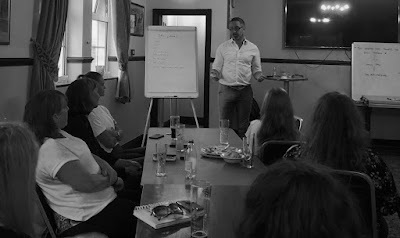Bad Language
Describing my horse, not his personality nor his ears, although they are the best ears a horse could every have, despite being told by a lady in the warm up of a show he had ears just like a donkey, but describe him in physical training terms is a skill. Growing up in Ireland we were offered lots of wonderfully lyrical stories about horses, their parents, their uncles and aunts because we do genuinely come from the land of storytellers, for better and worse. One breeder I worked with could tell me the lineage of every horse on the farm and what its half sisters older brothers cousin competed in. I’m still none the wiser to whether it could bend left or right. This kind of describing makes it very easy to get stuck in descriptors that are more reflective of our brains rather than your horses physical training.
I often forget that I love horses for themselves and the riding came secondary and mostly because I needed to demonstrate I could make enough money to put food on the table to my horrified parents. Some said it's been very brave to stick at this profession but as it's the dynamic that rewards me the most it seems only logical to stay with it. Being able to ride means more than ever getting past the antiquated phrases into true detail if it’s going to happen well.
 |
| A Recent theory Talk |
Yearning to know a horse best can often be through the riding, it’s one of the more intimate moment in the relationship. On a side note, I believe that because I, as well as many others struggle with human relationships that the rider/horse dynamic is more enticing because it's not two humans. I struggle with humanity often, wondering about things I cannot affect. I can however effect my horses training. Approaching the training from a horse personality point of view leaves me no opening for how I’m going to signal or ask for something. With a perfectionist brain I often end up frozen in fear of making it worse. I have to work at forgetting the noise of story of the horse. Taking the template of riding and only using it only as a guide while also listening to each horses specific physically strengths and weaknesses creates a whole new language of training.
At the beginning of every lesson I ask my riders, how has your horse been, this isn’t a cue to tell me how sharp or sassy or quirky he is but that they're lacking in confidence in something and that together we are going to explore what that is. Forcing the phrase my horse is lacking in confidence in, shapes a whole new conversation in whether I’m fixing my horse or helping my horse. Once we’ve explored the underneath then we can throw around words, often very colourful as I’m Irish but we can be sure it’s useful language.
The biggest lesson I’m teaching riders is not “How to ride” but how to explore. How to be brave about examining past the description of the horse into how might this horse receive the training best. A very wise trainer once said to be there’s a very great difference between a bad horse and a difficult horse, too many people mix them up.


Comments